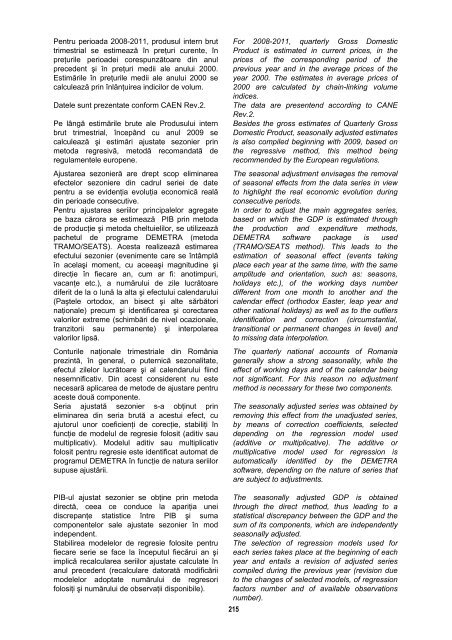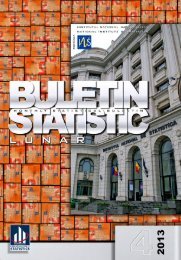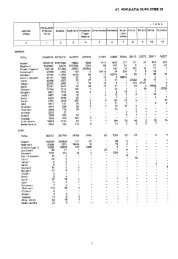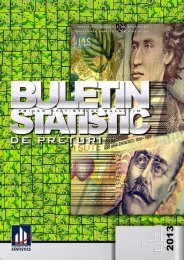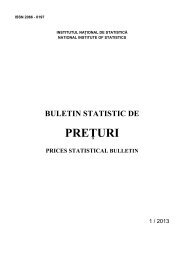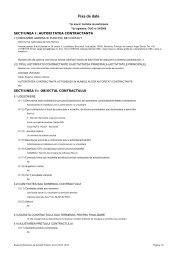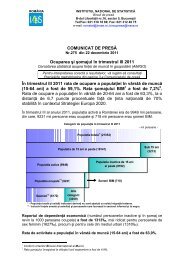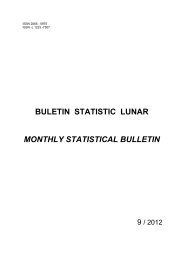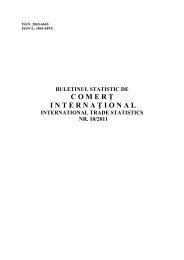BULETIN STATISTIC LUNAR MONTHLY STATISTICAL BULLETIN
BULETIN STATISTIC LUNAR MONTHLY STATISTICAL BULLETIN
BULETIN STATISTIC LUNAR MONTHLY STATISTICAL BULLETIN
You also want an ePaper? Increase the reach of your titles
YUMPU automatically turns print PDFs into web optimized ePapers that Google loves.
Pentru perioada 2008-2011, produsul intern brut<br />
trimestrial se estimează în preţuri curente, în<br />
preţurile perioadei corespunzătoare din anul<br />
precedent şi în preţuri medii ale anului 2000.<br />
Estimările în preţurile medii ale anului 2000 se<br />
calculează prin înlănţuirea indicilor de volum.<br />
Datele sunt prezentate conform CAEN Rev.2.<br />
Pe lângă estimările brute ale Produsului intern<br />
brut trimestrial, începând cu anul 2009 se<br />
calculează şi estimări ajustate sezonier prin<br />
metoda regresivă, metodă recomandată de<br />
regulamentele europene.<br />
Ajustarea sezonieră are drept scop eliminarea<br />
efectelor sezoniere din cadrul seriei de date<br />
pentru a se evidenţia evoluţia economică reală<br />
din perioade consecutive.<br />
Pentru ajustarea seriilor principalelor agregate<br />
pe baza cărora se estimează PIB prin metoda<br />
de producţie şi metoda cheltuielilor, se utilizează<br />
pachetul de programe DEMETRA (metoda<br />
TRAMO/SEATS). Acesta realizează estimarea<br />
efectului sezonier (evenimente care se întâmplă<br />
în acelaşi moment, cu aceeaşi magnitudine şi<br />
direcţie în fiecare an, cum ar fi: anotimpuri,<br />
vacanţe etc.), a numărului de zile lucrătoare<br />
diferit de la o lună la alta şi efectului calendarului<br />
(Paştele ortodox, an bisect şi alte sărbători<br />
naţionale) precum şi identificarea şi corectarea<br />
valorilor extreme (schimbări de nivel ocazionale,<br />
tranzitorii sau permanente) şi interpolarea<br />
valorilor lipsă.<br />
Conturile naţionale trimestriale din România<br />
prezintă, în general, o puternică sezonalitate,<br />
efectul zilelor lucrătoare şi al calendarului fiind<br />
nesemnificativ. Din acest considerent nu este<br />
necesară aplicarea de metode de ajustare pentru<br />
aceste două componente.<br />
Seria ajustată sezonier s-a obţinut prin<br />
eliminarea din seria brută a acestui efect, cu<br />
ajutorul unor coeficienţi de corecţie, stabiliţi în<br />
funcţie de modelul de regresie folosit (aditiv sau<br />
multiplicativ). Modelul aditiv sau multiplicativ<br />
folosit pentru regresie este identificat automat de<br />
programul DEMETRA în funcţie de natura seriilor<br />
supuse ajustării.<br />
PIB-ul ajustat sezonier se obţine prin metoda<br />
directă, ceea ce conduce la apariţia unei<br />
discrepanţe statistice între PIB şi suma<br />
componentelor sale ajustate sezonier în mod<br />
independent.<br />
Stabilirea modelelor de regresie folosite pentru<br />
fiecare serie se face la începutul fiecărui an şi<br />
implică recalcularea seriilor ajustate calculate în<br />
anul precedent (recalculare datorată modificării<br />
modelelor adoptate numărului de regresori<br />
folosiţi şi numărului de observaţii disponibile).<br />
For 2008-2011, quarterly Gross Domestic<br />
Product is estimated in current prices, in the<br />
prices of the corresponding period of the<br />
previous year and in the average prices of the<br />
year 2000. The estimates in average prices of<br />
2000 are calculated by chain-linking volume<br />
indices.<br />
The data are presentend according to CANE<br />
Rev.2.<br />
Besides the gross estimates of Quarterly Gross<br />
Domestic Product, seasonally adjusted estimates<br />
is also compiled beginning with 2009, based on<br />
the regressive method, this method being<br />
recommended by the European regulations.<br />
The seasonal adjustment envisages the removal<br />
of seasonal effects from the data series in view<br />
to highlight the real economic evolution during<br />
consecutive periods.<br />
In order to adjust the main aggregates series,<br />
based on which the GDP is estimated through<br />
the production and expenditure methods,<br />
DEMETRA software package is used<br />
(TRAMO/SEATS method). This leads to the<br />
estimation of seasonal effect (events taking<br />
place each year at the same time, with the same<br />
amplitude and orientation, such as: seasons,<br />
holidays etc.), of the working days number<br />
different from one month to another and the<br />
calendar effect (orthodox Easter, leap year and<br />
other national holidays) as well as to the outliers<br />
identification and correction (circumstantial,<br />
transitional or permanent changes in level) and<br />
to missing data interpolation.<br />
The quarterly national accounts of Romania<br />
generally show a strong seasonality, while the<br />
effect of working days and of the calendar being<br />
not significant. For this reason no adjustment<br />
method is necessary for these two components.<br />
The seasonally adjusted series was obtained by<br />
removing this effect from the unadjusted series,<br />
by means of correction coefficients, selected<br />
depending on the regression model used<br />
(additive or multiplicative). The additive or<br />
multiplicative model used for regression is<br />
automatically identified by the DEMETRA<br />
software, depending on the nature of series that<br />
are subject to adjustments.<br />
The seasonally adjusted GDP is obtained<br />
through the direct method, thus leading to a<br />
statistical discrepancy between the GDP and the<br />
sum of its components, which are independently<br />
seasonally adjusted.<br />
The selection of regression models used for<br />
each series takes place at the beginning of each<br />
year and entails a revision of adjusted series<br />
compiled during the previous year (revision due<br />
to the changes of selected models, of regression<br />
factors number and of available observations<br />
number).<br />
215


